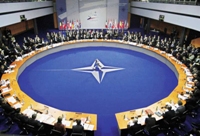(This was cross-posted at www.YoungAtlanticist.org. Sameer will be blogging live from Bucharest from April 2-4 during the NATO Summit.)

Leading up to the NATO Summit in Bucharest, the op-ed pages have provided a transatlantic policymaker’s feast of competing proposals, warnings, and framings of the critical events facing the 59 year old military alliance. NATO expansion and commitments to the ISAF in Afghanistan obviously rise to the top as critical tests of the alliance’s future, but at some level they seem to run into each other and potentially tradeoff with one another.
In response to criticism of European limitations on Afghanistan commitments and caveats on their deployed forces, Robert Kaplan offers a compelling argument for embracing a two-tiered NATO, one that offers the nation building/development expertise and resources, the other that ponies up military assets. However, if we were ready to embrace asymmetric burden-sharing for strategic ends, one could conceivably conclude that we should proactively seek some more non-Western, perhaps Middle Eastern or Islamic countries, to join a regional alliance rather than solely depending on NATO. Such deployments, much like those called for in Darfur, would at least provide an added political lift critical to winning over the Afghan population (considered to be 80% of the counterinsurgency equation).
As for NATO expansion, the Adriatic three seem to be nearly a forgone conclusion, but I can’t see the real strategic benefits they bring to the alliance, nor the countries suggested for the following round. Despite Donald Rumsfeld’s assurances, Georgia and Ukraine clearly seem to be landmines in the path of an expansion agenda.
Suspending all the imprecise and misleading talk of color revolutions for a moment, Ukraine and Georgia are too politically unstable –the former divided in their Western and Russian leanings and the later with parts of the country on the brink of declaring Kosovor-style independence — to be of much use to the alliance in the near term. And such a move would provoke real Russian anger far more than the phantom punches over the missile shield.
The Economist and the Eurasia Monitor both point out that Russia might likely move to open land and air supply routes to Afghanistan through Russia for NATO operations, a significant move both for tactical and symbolic reasons. And recent discussions with Russia on the missile shield in Eastern Europe have finally begun to show signs of progress. Foreclosing on these two potential strategic gains for a couple of ambivalent NATO members who bring few military assets to the table seems like a poor trade.
Rumsfeld laments the uneven commitment levels of various NATO countries in Afghanistan (which I concede to Kaplan is inevitable given that Europe is not immediately threatened like it was during the Cold War), but never makes an effective case for how expansion would actually bridge these gaps. I find it highly unlikely Ukraine and Georgia would be able to make greater and firmer commitments without further political upheaval.
Finally, a high level NATO official privately expressed that France’s much-anticipated declaration of rejoining NATO’s integrated command system and deploying approximately one thousand troops to NATO will not only free US troops to join and revitalize Canadian troops in the South (hopefully keeping them in the ISAF awhile longer) but also motivate some other European countries to follow suit and provide more boots and hardware on the ground, particularly the Germans and perhaps the Dutch to follow. But Germany is adamantly opposed to expansion to Georgia and Ukraine, likely due to its fear of Russian energy retribution. Privileging German concerns above the empty gains of NATO expansion is an easy choice — one that can maintain the existing alliance and perhaps secure its future with further commitments for long-term projects like Afghanistan.
— Sameer Lalwani


4 comments on “Hard Choices for NATO: Expansion vs Commitments”